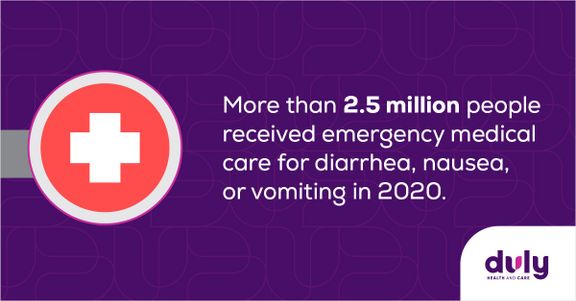“Should I call my doctor?”
“Do I need to go to urgent care?”
“Can I just ride this out on my own at home?”
When your body starts acting out of the ordinary, you might find yourself asking these questions. It can be hard to tell if an unusual symptom is just a part of life, or when it actually requires medical attention or immediate care.
This is especially true when it comes to symptoms like vomiting or diarrhea — sometimes they are harmless, and sometimes they are signs of something more serious.
Here’s how you can know what kind of medical attention is best based on your symptoms.
Should I Go to Immediate Care for Diarrhea?
While many might feel embarrassed to talk about their bowel movements, diarrhea is a normal part of life. It can be caused by everything from food your stomach doesn’t agree with to common viruses like the flu to parasites in food or water.
Most adults will have acute diarrhea once a year. Now, before you think that number can’t possibly be correct, acute diarrhea is defined as three or more instances of loose stools in one day and typically lasting a few days.
Often, acute diarrhea isn’t necessarily a cause for alarm and will sort itself out at home. But in some cases, it can be an indicator of a bigger health concern.

You should contact your healthcare provider if your diarrhea is also accompanied by:
- Symptoms of dehydration like a headache, dry mouth, lightheadedness, or exhaustion
- A fever of 102 degrees or higher
- Intense pain in your rectum or abdomen (for adults)
- Stools that are bloody, tarry, black, or contain pus
If you are experiencing symptoms during normal, weekday hours, call your primary care provider first. They might encourage you to come into the office or direct you to immediate care. But, when you aren’t feeling well outside of regular appointment hours, immediate care is there when you need it.
Find Immediate Care near you >
Diarrhea Guidance for Children and Infants
Diarrhea is common in children, but they can be much more likely to experience dehydration — which can make diarrhea particularly harmful to infants and newborns. Call your child’s physician if:
- Your child’s diarrhea lasts more than 24 hours
- Your child is having diarrhea every 1 to 2 hours or more often
- Your child is experiencing symptoms of dehydration
Should I Go to Immediate Care for Nausea or Vomiting?
Like diarrhea, throwing up is a messy part of life, and it can be caused by many different factors. From food poisoning to morning sickness to riding a big roller coaster, there are plenty of normal reasons you might feel nauseous.
But, also like diarrhea, sometimes vomiting can be a sign of something more serious, like an ulcer or a blockage in your intestines.
You should call your provider if:
- You vomit more than 3 times in 24 hours
- Vomiting lasts for longer than 1 day
- You can’t keep fluids down for more than 12 hours
- You also have a headache, stomach ache, or stiff neck
- You haven’t been able to urinate for 8 hours
When Should I Go to Immediate Care
Our Immediate Care Centers are here for those in-between moments when you need answers sooner. With locations close to home, an average wait time of 30 minutes or less, and costs far lower than an ER visit, you can get the care you need without the added stress. Walk in or schedule online to find an Immediate Care Center near you.
Find an Immediate Care Near You
What Should I Actually Go to Immediate Care For?
While nausea, vomiting, and diarrhea might not always send you running to immediate care, it’s good to know when to seek medical attention for the symptoms you’re experiencing.
Vomiting and diarrhea can also be a symptom of other health issues. Depending on what other symptoms you have. In addition, this should help determine what kind of medical attention you seek. Here are some common conditions that vomiting, and diarrhea can accompany — and who you should see about them:
Norovirus — Call your primary care provider if you are experiencing*:
- Diarrhea or vomiting
- Stomach pain, headache, or body aches
- Fever
* There’s no known treatment for norovirus, however, your provider can recommend ways to rest at home and stay hydrated.
Kidney stones — Go to immediate care if you are experiencing:
- Vomiting
- Intense sharp pains in your back, side, lower abdomen, or groin
- Urine that has red, pink, or brown blood in it
- Pain while urinating, a constant need to urinate, or difficulty urinating
Appendicitis — Go to the emergency room if you are experiencing:
- Vomiting or diarrhea
- Pain in your lower right abdomen that gets worse over time and depending on how you move
- Pain in your belly or side that feels different than any other kind of pain you’ve experienced before
- Loss of appetite
Visit a Duly Immediate Care Location Near You
Health issues don’t really care about your schedule, and immediate care can be a great option when:
- You can’t see your regular provider
- You notice signs of dehydration in yourself or your child
- Your vomiting, diarrhea, or nausea are paired with symptoms of fever, or pain in your abdomen
When you are experiencing symptoms that are out of the norm, give us a call, schedule a visit, or just walk in, and we can ensure you will receive the care you need.
Find Immediate Care near you >
Also check out: Should I Go to Immediate Care Quiz.
Health Topics:








